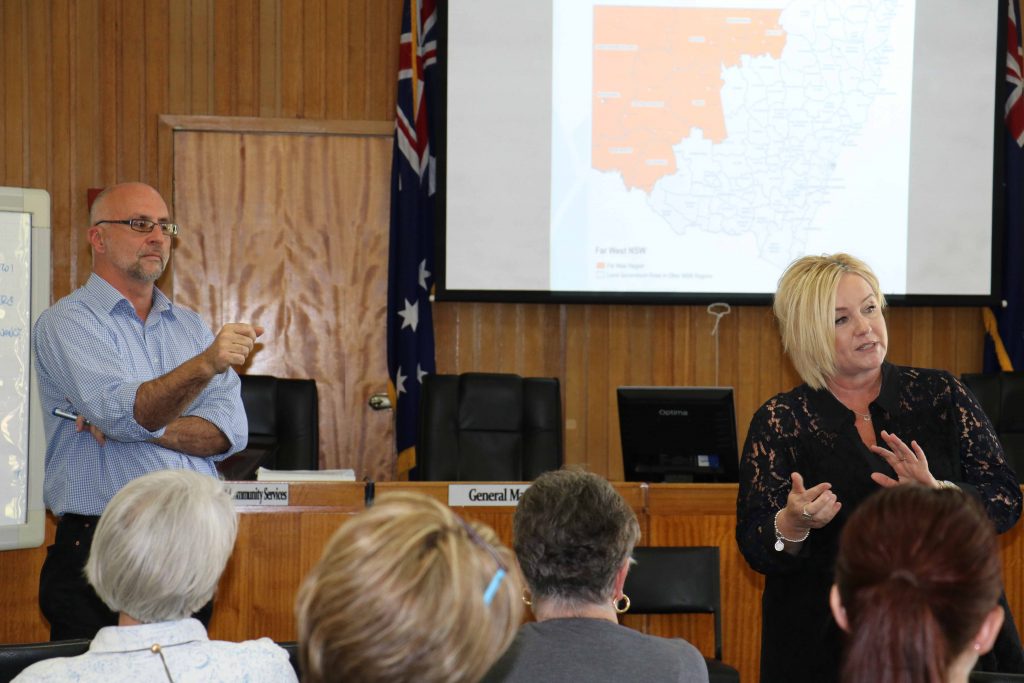
A group of 30 locals attended the a community consultation meeting last Friday to put forward their ideas on the government’s proposed Far West Initiative (FWI).
While the Cobar community members were not hostile with their comments, many said they were opposed to the FWI proposal, they questioned the need for it, what its role would be, and how the FWI would be funded.
Community consultation meetings are currently being facilitated around the far west region by independent chair Mark Conlon who has 25 years experience working in government in the region.
Mr Conlon, along with Melissa Gibbs from the Office of Local Government, have attended meetings at Balranald, Wentworth, Broken Hill, Walgett, the Unincorporated Area, Brewarrina and Bourke.
Ms Gibbs said the issues raised at the Cobar community consultation meeting were similar to issues raised by other towns.
“People are asking about funding, representation, loss of a local voice, loss of representation at a local level, ‘This is a State Government problem and should be fixed by the State Government’,” Ms Gibbs said.
The aim of the FWI is to develop a new whole-of-government service governance model for all services delivered in Far West NSW.
This would incorporate the eight local government councils of Cobar, Balranald, Bourke, Brewarrina, Broken Hill, Central Darling, Walgett and Wentworth as well as the NSW Unincorporated Area, a total area of more than 323,000 square kilometres.
Ms Gibbs said the initiative aims to improve the outcomes of the people of Far Western NSW by identifying the opportunities and challenges of the area and improving government service delivery.
“Balranald felt they don’t have a lot in common with Cobar and vice versa probably.
“Mergers [of councils] are not being considered for the far west.
“They have been considered elsewhere, but not in the far west,” Ms Gibbs assured.
She also said consolidation of local government staff is also not being considered.
Ms Gibbs told the meeting the government felt that a lot of money was being spent in the far west region however it was not being spent efficiently and not delivering the most benefit.
“It’s not about saying things are not working but about making things better.”
She said communities have said at meetings they do not want their rate funding diverted from their own councils and that they value their local representation.
Ms Gibbs said she can see that people are passionate about their communities and are worried these changes will harm their communities.
She told the meeting the aim of the FWI was not to create another level of government but to bring together the three levels of government and non government agencies who supply services to the far west.
It was suggested at the Cobar consultation meeting last Friday that the government problems have not yet been defined before a solution has been developed.
“The government hasn’t done their homework before they came up with this idea,” a community member said.
Another questioned if the proposed area for the FWI was too big of an area.
Mayor Lilliane Brady is not keen to see the FWI introduced.
“Why do we need to change? Why can’t we stay as we are?,” she said.
“We aren’t any ordinary far west town; we give money to the State Government.
“We are different to the rest of the Western Division,” Cr Brady told the meeting.
She said Cobar’s mining companies contribute millions of dollars in mining royalties to the State Government.
“And $250million in taxes comes from Cobar,” she said.
More consultation meetings were held earlier this week at Euabalong and Nymagee and a second meeting was held in Cobar last night with participants all invited to have their say.
Mr Conlon said the closing date for public submissions has been extended and is undetermined at this stage as they have not been able to access some areas to hold meetings due to roads being closed by rain.
He said the next step in the process will be for the minister to meet with the FWI committee to discuss the feedback from the community consultation meetings.
They will then consider introducing the proposed changes in 2017.
It was requested at the Cobar meeting that all of the questions that have been proposed at the consultation meetings be answered and that the information is reported back to each community.
